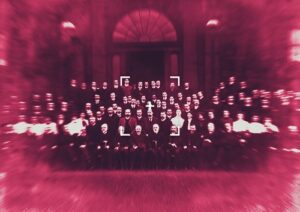Reframed: conversations about heritage and inclusion at The Royal College of Physicians and Surgeons of Glasgow

The project
The Royal College of Physicians and Surgeons of Glasgow was founded in 1599 and continues to provide education, assessment and career support to health care professionals around the world. The College’s history is deep and complex, with inequalities embedded within its heritage and collections.
With the Reframed programme we wanted to ‘reframe’ the view of our heritage, to ensure those embedded inequalities were revealed, discussed and acted upon – to change our heritage practice.
Through the programme we delivered 5 monthly digital events. Each event reframed a key area of the College’s collections and heritage, discussing colonialism and white saviour complex, gender inequality, and representations of mental health.
"The reflective manner in which the College's heritage was interrogated raised important questions about the histories that are told, and those which remain hidden and unacknowledged. I particularly valued the openness and transparency of the Heritage team for holding these discussions in public."
Kristin Hay, University of Strathclyde
Challenges and successes
- Tackling inequalities in our heritage meant challenging long-established narratives. We knew this would be uncomfortable for some, but addressing these issues in an open, public-facing way meant including more people in the conversations.
- The programme was built around a collaborative approach. As a small heritage team, we recognise how essential it is to work with others across academic, health and cultural sectors. The programme was successful in bringing together a diverse range of collaborators from across sectors, contributing expertise and insight to these conversations.
- Developing and engaging audiences with digital events will have been a challenge shared by many during 2020/21! Recording the events to ensure they continue to be accessible as part of our digital programme has been a great way of ensuring these conversations can continue to engage with audiences.
The impact it has made
- The Reframed ethos has become embedded in other areas of our heritage practice beyond the programme itself, for example, in exhibition content and heritage interpretation. While the programme was running we were developing a new digital exhibition on the surgeon Joseph Lister. We decided to integrate Reframed content directly into the exhibition, as an important, usually untold, part of the Lister story.
- Integration into other heritage practice spread and we quickly began to grasp opportunities to merge this approach with other initiatives in our wider Heritage and Inclusion programme, for example our PhD internship on gender inequality in the College’s history became part of the Reframed programme. This research then became integrated into a redisplay project for our College Hall – a significant shift and challenge to established display of portraiture, heritage narratives and representation.
- We have now embedded the Reframed approach into our core-funded programme for 2022, with plans for further collaboration and engagement with wider audiences.
Lessons learned
- Establishing the Reframed programme felt like a bold, and sometimes scary, move. As a small team, we shared the load of leading different events, which helped. We benefited hugely from the wisdom and support of our collaborators, without whom we wouldn’t be able to progress with this work.
- In many ways the Reframed approach involved a step back from the collections, building, and displays, that we are usually surrounded by every day. Working from home during the pandemic provided us with a refreshing distance from those established ways of looking at and talking about our heritage. We should step back and adjust our view more often!
Guidance
- We were upfront from the beginning of this programme that we didn’t have all the answers, and that the conversations were just the start of a change of practice. This open and honest approach worked. Start the conversation and see where it goes.
- Open your arms to collaboration – invite people to speak about their research, their working practice, their passions, and the learning can be amazing.
- Commit to change. Embedding new approaches isn’t easy, but if this is the fundamental aim from the beginning, it is easier to stick with it.
Further information
If you would like more information about this project please contact Ross McGregor, Royal College of Physicians and Surgeons of Glasgow, email: ross.mcgregor@rcpsg.ac.uk